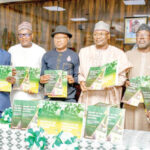On 25th February 2022, President Muhammadu Buhari signed the 2022 Electoral Act Amendment Bill into law as it repeals the Electoral Act No. 6, 2010.
The Act is intended to bring innovations to the regulation of Federal, State and Area Council elections in Nigeria.
As the 2023 general elections approach, and electorates are already looking forward to electing new crop of leaders, the new modifications in the Act are expected to cause some changes in voting patterns.
Modifications in the Act
One of the new changes in the Act is the financial independence to the Independent National Electoral Commission (INEC).
- Students have abandoned libraries – NLA president
- Skills, not degrees can develop Nigeria – Zazzau Emir
Daily Trust on Sunday checks show that the new Act establishes the Independent National Electoral Commission Fund, whereby payments from the federal government, investments made from the fund and other aids and grants shall be paid to enable the Independent National Electoral Commission (“the Commission”) perform its functions.
In the same vein, the Act stipulates that election funds due to the Commission for any general elections are to be released not later than one year before the next general election.
This provision grants financial autonomy to the Commission, as it may now receive funds for the conduct of elections directly as opposed to getting funds subsequent to vetting by the Ministry of Finance.
Secondly, the new Act provides that the Commission shall, not later than 360 days before the day appointed for holding of an election under this Act, publish a notice in each State of the Federation and the Federal Capital Territory stating the date of the election and appointing the place at which nomination papers are to be delivered.
The notice according to the new Act is expected to be published in each constituency in respect of which an election is to be held.
This negates the provisions of the old Electoral Act which provided that the Commission should publish this notice not later than 90 days before the date of election.
In terms of by-elections, the new Act retains the same provision as the old Act, as the timeframe for publishing a notice stating the date of by-elections is 14 days.
Early Party Primaries
The New Electoral Act encourages early political party primaries as it empowers INEC to mandate parties to submit the list of their sponsored candidates who have emerged from valid primaries conducted by the party, not later than 180 days before the date appointed for a general election.
This differs from the former Act which prescribed that this submission should be done not less than 60 days before the date of general elections. The change in the timeframe to submit the names of party candidates from 60 days to 180 days makes it compulsory for political parties to conduct their primaries early enough to meet up with submission of their list of candidates at least 180 days before the general elections.
Extension Of Timeframe for Campaigns by Political Parties
The new Act provides that the period of campaigning in public by every political party shall commence 150 days before polling day and end 24 hours prior to that day.
This is different from the provisions of the former Act which prescribe that campaigns shall commence 90 days prior to polling day and end 24 hours prior to that day.
The impact of this provision is the extended time given to political parties to disseminate their campaign messages to the populace and the corresponding extended time for the electorate to decide what party and candidate would receive their votes.
Provision for Central Electronic Voter Database
The new Act provides that the Commission shall keep the Register of Voters at its National Headquarters and other locations, provided that the Register shall be kept in electronic format in its central database, in addition to being kept in manual or hardcopy format. Under the former Act, this Register was kept in manual or hardcopy format only.
Revision of Definition of Overvoting
Under the new Act, where the number of votes cast at an election in any polling unit exceeds the number of accredited voters in that polling unit, the Presiding officer shall cancel the result of the election in that polling unit.
Here “Number of accredited voters” refers to the number of intending voters accredited to vote in an election on the election day. Under the former Act, it is when the number of votes cast at an election in any polling unit exceeds the number of registered voters in that polling unit, that the Presiding officer shall cancel the result of the election in that polling unit.
Based on the provisions of the new Act, ‘overvoting’ would mean where votes cast at a polling unit exceeds the number of accredited voters and not the number of registered voters as provided in the former Act.
Exclusion of Political Appointees from Acting as Voting Delegates or Aspirants
Checks by Daily Trust shows that Under Section 84 (12), the new Act stipulates that no political appointee at any level shall be a voting delegate or be voted for at the Convention or Congress of any political party for the purpose of the nomination of candidates for any election.
This means that political appointees must relinquish their positions before they can be eligible to participate in the electoral process either as a candidate or as a delegate.
Death of Electoral Candidates
The New Electoral Act provides that where before the commencement of polls a candidate dies, the election shall be postponed and shall commence within 14 days of the candidate’s death. Where a candidate dies after polls, but before announcement of final winner/ announcement of final result; the implication is that the election will be suspended for not more than 21 days.
Technological adoption in electoral process
Under the new Act, the use of electronic devices such as smart card readers, electronic voting machines and other technological devices such as the Bimodal Voter Registration System (BVAS), is allowed in the accreditation process for voters and in the general conduct of elections.
Furthermore, the new Act provides for electronic transmission of election results in accordance with the procedure determined by the Commission.
This Explainer is done in partnership with the Centre for Democracy and Development (CDD)

 Join Daily Trust WhatsApp Community For Quick Access To News and Happenings Around You.
Join Daily Trust WhatsApp Community For Quick Access To News and Happenings Around You.


